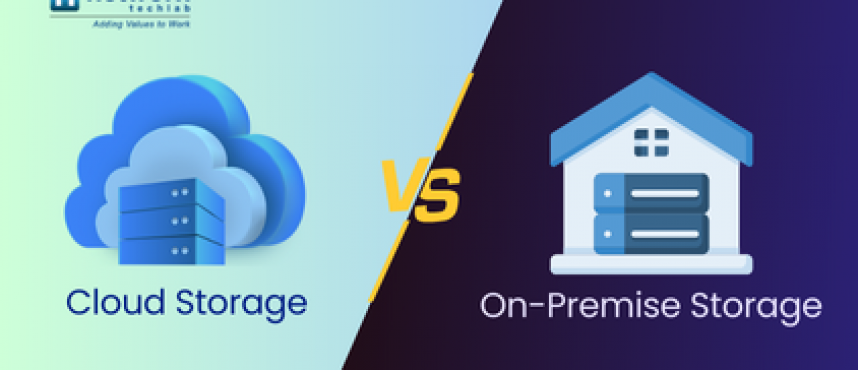Cloud Storage Vs. On-Premise Storage
Advanced technologies are driving most industries in India. And with it, businesses are navigating efficient ways to get rid of data storage issues. The latest being the boom of cloud storage services, which offer a remote way of managing huge data without any hassle. With these advantages, most enterprises are choosing cloud storage services from reputed providers like us at Network Techlab, while others are stuck in a dilemma, whether to take the leap of faith or not.
Well, that was not the complete picture, and there are more factors to unlock in a cloud storage mode of service. This article will highlight the key differences between the two, which will help you comprehend why MSMEs and other big-shot companies are opting for cloud services by the day.
Diving into the definitions: Cloud & On-Premise Storage
Cloud storage: It is a kind of service that allows enterprises/businesses to store their vital data on the internet. It doesn’t involve any physical infrastructure, and the complete operation (access/add, and editing) is done online. These services are outsourced to third-party service providers like us, who are responsible for the maintenance of storage.
On-Premise Storage: As the name suggests, these storage services require physical infrastructure within your business premises to store all data related to your local network. Your in-house team (IT department comprising IT professionals) will be the one towards its maintenance, and periodic updates of the system.
Pros and Cons of Cloud Storage Services for Businesses
The pros of cloud storage surpass those of the on-premise one, and here are the key ones-
- Budget-friendly- This kind of storage service doesn’t require businesses to purchase hardware. This is because Cloud Storage is managed online, and thus one can avoid CAPEX factors, which are unavoidable in the case of on-premise storage. Most standard cloud-based storage providers offer monthly subscriptions that allow enterprises to opt for particular features and add-ons to keep their expenses within an optimum level, according to their fiscal budget.
- Can be Personalized According to Business Requirements- In the case of on-site storage services, enterprises have to buy new hardware to make room for growth in the And if they don’t have the capacity, it hinders their scalability. It sometimes hampers the consumer service as well, since it becomes hard to access the servers. But cloud storage, on the other hand, fosters growth and allows room for instant addition to datasets. And it takes just a few clicks to adjust for the same.
- Flawless Data Backups- MSMEs understand the seriousness of data loss since it affects productivity and brand reputation. Cloud storage services ensure that the business data backup is done seamlessly with automation, eliminating the redundant work involved in the case with an on-premise storage service.
There are minute cons which mostly don’t bother the bigger goals of businesses, and those are-
- Scalability costs are high only if the enterprise neglects the optimization of data. They need to come up with better data managers to avoid unnecessary expenses.
- Access to data is only through online. And it’s not an issue to MSMEs in India since most of them have high-speed internet available to them (even in remote geographies nowadays).
- Sometimes there is a slight risk of a data breach. But it can be avoided if the businesses start to rely on renowned service providers like us.
Pros and Cons of On-Premise Storage for Businesses
There are certain advantages of on-premise storage systems, but it doesn’t create an impact on businesses as of today’s advanced needs. Let’s look at some of them-
- Some businesses consider them more secure since they store data offline and are safe from cyberthreats. But these days, more robust encryption is being followed, so it’s not a big deal.
- Now, since these storage systems can be operated without the internet, businesses in the remotest geographies can rely on them (as they don’t have proper internet speeds). This section of the industry is very specific and small.
- It minimizes the internet bills. But again, every business needs the internet in some way or the other for its administrative and client addressing purposes like emails, virtual meetings,
And there are numerous cons to an on-site storage system like-
- Expensive maintenance costs
- Scaling is challenging and requires heavy CAPEX
- High risk of data loss since system malfunctioning is quite frequent with its age. And if a substantial error occurs, then all of the business data will be lost permanently.
Conclusion
Each option of storing data has its bright and dark sides for an industry. Where on-premise storage can offer access to data even in the remotest geographic locations, cloud storage services are offering prompt, scalable, budget-friendly, and feasible benefits to the diverse sectors. When opting for storage needs of your business, you should consider 360-degree factors like budget, long-term, and short-term plans.
If you are strategizing on how your business will store its data in the coming days, then our prompt and efficient team of IT experts can help you get the best cloud storage services at a reasonable price. Reach out to us today at Network Techlab to learn more about our smart deals. Choose cloud storage and make your brand scalable!




